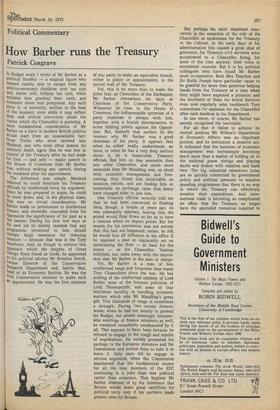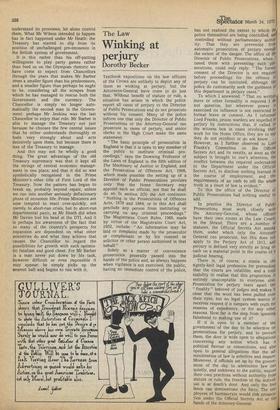Political Commentary
How Barber runs the Treasury
Patrick Cosgrave
In Budget week I wrote of Mr Barber as a Political Houdini — a magical figure who seemed readily able to escape from any Politico-economic thraldom with tax cuts and, better still, lollipop tax cuts, while socialist foes gnashed their teeth, and economic doom was postponed. Any such Piece is, of necessity, written in the heat of the moment; even while it may reflect deep and critical conviction about the course which the Chancellor is pursuing. A more fundamental consideration of Mr barber as a force in modern British politics Would start from an unassailable fact: those Tories who most revered lain Macleod, and who most often lament his Untimely death, agree that he was less in control of the Treasury after he had made his first — and only — major speech in the House of Commons than Mr Barber Was, without making any speech, during the weekend after his appointment.
The difference was simple. Macleod believed he could dominate his Treasury officials by intellectual force, by argument. Since he was prepared to argue, he could be worn down: and, in his physical state, that was no trivial consideration. Mr barber made no pretensions to intellectual stature, and shrewdly concealed from his °Pponents the significance of his past as a tax lawyer. During his first few days at Ms new job he merely insisted that any Programme presented to him should contain large measures for reducing taxation — because that was in the Tory Manifesto. And, as though to enforce this approach which the knights of Great George Steet found so crude, he appointed as his political advisor Mr Brendon Sewill, former Director of the Conservative Research Department and, before that, h,,ead of its Economic Section. He was the first Conservative minister to make such appointment. He was the first minister of any party to make an equivalent breach, either in policy or appointments, in the sacred wall of the Treasury.
Yet, this is no more than to make the point that, as Chancellor of the Exchequer, Mr Barber remembers his clays as Chairman of the Conservative Party. Whenever he rises in the House of . Commons, the indispensable optimism of a party chairman is always with him, together with a boyish determination to score fiddling points against the Opposition. But, beneath that surface lie the reasons why Mr Barber was a good chairman of his party. It appears that when he either really understands an issue, or when he has a very deep instinct about it, he is immovable. Treasury officials find him no less amenable than any other Chancellor, and much more amenable than Mr Maudling was, on short term economic management and forecasting; they found him intractable on taxation reform, and are finding him so intractable on exchange rates that many have changed sides to join him.
One Treasury official recently told me that he had been converted to floating rates though, a couple of years ago, he was adamantly opposed, fearing that the pound would float down so far as to have a ruinous effect on import prices. But the reason for his conversion was not merely that this had not happened: rather, he felt he would lose all influenae in his office if he opposed a man so implacably set on maintaining the float — at least for the nonce — as his Chancellor. Various lobbyists, too, come away with the impression that Mr Barber is the man in charge.
Yet, Mr Barber is a man of less intellectual range and firepower than many Tory Chancellors since the war. He has nothing of the intellectual subtlety of Lord Butler; none of the forensic precision of Lord Thorneycroft; and none of that felicitious tactility in handling economic matters which was Mr Maudling's great gift. This limitation of range is sometimes a strength. During two recent frenetic weeks when he had not merely to present his Budget, but attend seemingly innumer able meetings of finance ministers as well, he remained remarkably unexhausted by it all. This appears to have been because he refused to engage in the rough and tumble of negotiations. He merely presented his package to the European ministers and the Commission and invited them to take it or leave it. Only once did he engage in serious argument, when the Commission maintained that the fundamental reason for all the nine members of the EEC combining in a joint float was political rather than economic. That bugbear Mr Barber disposed of by his insistence that Britain would make great sacrifices for political unity only if her partners made greater ones for Britain. But perhaps his most important innovation is the cessation of the role of the Chancellor as spokesman for the Treasury in the Cabinet. In the early days of his administration this caused a great deal of grievance, for Treasury civil servants were accustomed to a Chancellor being, for most of the time anyway, their voice in ministerial councils. But it is his political colleagues who have found Mr Barber most co-operative. Both Mrs Thatcher and Sir Keith Joseph have particular cause to be grateful for more than generous helping hands from the Treasury at a time when they might have expected a pittance; and the Secretary of State for Social Services even now regularly asks backbench Tory committees for applause for the Chancellor • after each handout to his Department, In one sense, of course, Mr Barber has merely recognised the inevitable.
For all that it failed to achieve its central purpose Mr Wilson's Department of Economic Affairs was an important portent, and its institution a creative act. It indicated that the business of economic management was increasingly becoming much more than a matter of holding on to the national purse strings and playing ducks and drakes with taxation and bank 'rate. The big industrial ministries today are so quickly committed by government policy and political pressure to massive spending programmes that there is no way in which the Treasury can effectively monitor their expenditure. And international trade is becoming so complicated an affair that the Treasury no longer have the specialist resources required to understand its processes, let alone control them. What Mr Wilson intended to happen • has in fact happened under Mr Heath: the Treasury has started to slip from its position of unchallenged pre-eminence in the British system of government.
It is this rather than his off-putting willingness to play party games rather than feed us on the Olympian rhetoric we have come to expect from Chancellors through the years that makes Mr Barber seem a smaller figure than his predecessors, and a smaller figure than perhaps he ought to be, considering all the scrapes from which he has managed to rescue both the Government and the currency. The Chancellor is simply no longer automatically the second man in the Government: perhaps Mr Jenkins was the last Chancellor to enjoy that role. Mr Barber is able to manage the Treasury not just because he chooses the few central issues that he either understands thoroughly or feels very strongly about and acts decisively upon them, but because there is less of the Treasury to manage.
And this may not be wholly a good thing. The great advantage of the old Treasury supremacy was that it kept all the strings of central economic management in one place; and that it did so was symbolically recognised in the Prime Minister's other title of First Lord of the Treasury. Now the pattern has begun to break up, probably beyond repair, unless we run into another seriously deflationary • phase of economic life. Prime Ministers are now tempted to react over-quickly, not merely to short-run crisis, but to short-run departmental panic, as Mr Heath did when Mr Davies lost his head at the DTI. And it is perhaps his awareness of the fact that so many of the country's prospects for expansion are dependent on what other ministries do and what they achieve that causes the Chancellor to regard the possibilities for growth with such optimistic fatalism and good cheer. For Mr Barber is a man never put down by his task, however difficult or even impossible it may appear: he simply picks up the nearest ball and begins to run with it.



































 Previous page
Previous page